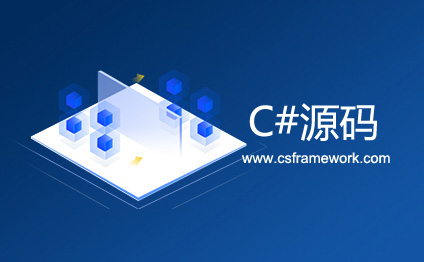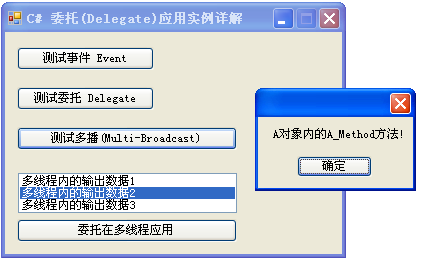|
C#委托(Delegate)事件(Event)应用详解 (原)
 C#委托(Delegate)事件(Event)应用详解 (原) C#委托(Delegate)事件(Event)应用详解 (原) 委托 (Delegate) 多播委托(Multi-Broadcast Delegate)
using System; using System.Collections.Generic; using System.Text; using System.Windows.Forms; using System.Threading; namespace CSFramework.Tech.Delegate { //测试用例 public class TestClasses { //测试委托 public void TestDelegate() { A a = new A(); B b = new B(); b.SetDelegateMethod(a.A_Method); //给A对象设置一个委托,该委托是委托A对象内的A_Method方法 b.TestDelegate(); //测试这个委托。注意提示信息 } //测试事件 public void TestEvent() { A a = new A(); B b = new B(); //给b对象的MyEven事件绑定一个委托方法,该委托是委托A对象内的A_Method方法 b.MyEven += new MethodInvoke(a.A_Method); b.TestEvent(); //测试这个事件。注意提示信息 } //测试多播 public void TestMultiBroadcast() { A a = new A(); B b = new B(); b.MyEven += new MethodInvoke(a.A_Method); //给b对象的MyEven事件绑定一个委托方法A_Method b.MyEven += new MethodInvoke(a.AA_Method); //给b对象的MyEven事件绑定一个委托方法AA_Method b.TestEvent(); //测试这个事件。注意提示信息 } private WriteLogMethod _logMethod = null; private Form _owner = null; //测试线程内调用委托 public void TestDelegateInThread(Form owner,WriteLogMethod method) { _logMethod = method; _owner = owner; Thread t = new Thread(new ThreadStart(Run)); t.Start();//开始运行线程 } //多线程内的方法 private void Run() { // //直接调用_logMethod()试试? 会抛出异常: //Cross-thread operation not valid: Control ''''listBox1'''' accessed from a thread other than the thread it was created on. // /* _logMethod("多线程内的输出数据1"); _logMethod("多线程内的输出数据2"); _logMethod("多线程内的输出数据3"); */ // Control.Invoke()方法说明: // Executes the specified delegate, on the thread that owns the control''''s underlying // window handle, with the specified list of arguments. // _owner.Invoke(_logMethod, "多线程内的输出数据1"); _owner.Invoke(_logMethod, "多线程内的输出数据2"); _owner.Invoke(_logMethod, "多线程内的输出数据3"); } } /// <summary> /// 定义一个由多线程调用的委托类型.用于显示多线程内输出的数据. /// </summary> public delegate void WriteLogMethod(string log); /// <summary> /// 定义一个自定义委托类型 /// </summary> public delegate void MethodInvoke(); //测试类A public class A { public void A_Method() { MessageBox.Show("A对象内的A_Method方法!"); } public void AA_Method() { MessageBox.Show("A对象内的AA_Method方法!"); } } //测试类B public class B { public void B_Method() { MessageBox.Show("B对象内的方法!"); } //委托方法变量 private MethodInvoke _delegateMethod; public void SetDelegateMethod(MethodInvoke method) { _delegateMethod = method; } //测试由外部传进来的委托事件. public void TestDelegate() { if (_delegateMethod != null) _delegateMethod(); } //事件变量 private event MethodInvoke _MyEvent = null; /// <summary> /// 给对象定义一个事件。 /// 注意事件定义的标准语法,add,remove /// </summary> public event MethodInvoke MyEven { add { _MyEvent += new MethodInvoke(value); } remove { _MyEvent -= new MethodInvoke(value); } } //测试对象的事件。 public void TestEvent() { if (_MyEvent != null) _MyEvent(); } } } 如果委托是有返回值的函数,则只能调用最后一个委托函数: //测试有返回值的多播。 public void TestReturnValueEvent() { A a = new A(); B b = new B(); //产生有返回值的多播事件 b.ReturnValueEvent += new GetValueInvoke(a.GetValueA); //注:GetValueA()函数返回int 100 b.ReturnValueEvent += new GetValueInvoke(a.GetValueB); //注:GetValueB()函数返回int 200 b.TestEvent1(); //显示结果200; =a.GetValueB(); A a1 = new A(); B b1 = new B(); //产生有返回值的多播事件- 顺序相反 b1.ReturnValueEvent += new GetValueInvoke(a1.GetValueB); //注:GetValueB()函数返回int 200 b1.ReturnValueEvent += new GetValueInvoke(a1.GetValueA); //注:GetValueA()函数返回int 100 b1.TestEvent1(); //显示结果100; =a1.GetValueA(); } 证明:有返回值的函数用于多播是失败的! 结合测试用例思考: 为什么b.SetDelegateMethod()与b.MyEven += new MethodInvoke(a.A_Method)显示结果一致,但有什么区别呢? 解释:b.SetDelegateMethod()是调用SetDelegateMethod方法给b对象内的_delegateMethod变量赋值。 而b.MyEven += new MethodInvoke(a.A_Method)是给b.MyEven事件绑定一个MethodInvoke类型方法。使用"+="操作符表示给b.MyEven事件同时绑定多个方法,这就是C#内的多播应用。 因此b.SetDelegateMethod()是调用方法而b.MyEven += new MethodInvoke(a.A_Method)是给事件绑定方法。 如转载请注明出处:www.csframework.com C/S框架网  扫一扫加作者微信   演示程序下载
参考文档:
开发应用-命令模式(C#实现POS收银功能) 开发应用-观察者模式之C#实现缓存数据更新 C#.Net OOP系列之接口设计及策略应用实战 C#.Net WCF实例详解及源码下载 C#设计模式应用-单件模式(Singleton Pattern) C#调用C++编译的DLL详解 C#深入剖析事件(C# Event详解) C# WebService异步处理/异步调用详解 DevExpress XtraReport 开发指南-单表报表设计详解(C#) C# WebService代理类详解 C# 跟踪对象的所有事件触发 C#开发的MDI架构+Access数据库应用程序(增删改查) C#.Net窗体多重继承构造器及Load事件执行顺序详解 CSFramework.WebApi后端框架Token令牌体系架构与应用详解 C#获取按钮的EventClick事件,EventHandlerList委托的调用列表
其它资料:
什么是C/S结构? | C/S框架核心组成部分 | C/S框架-WebService部署图 | C/S框架-权限管理 | C/S结构系统框架 - 5.1旗舰版介绍 | C/S结构系统框架 - 功能介绍 | C/S结构系统框架 - 产品列表 | C/S结构系统框架 - 应用展示(图) | 三层体系架构详解 | C/S架构轻量级快速开发框架 | C/S框架网客户案例 | WebApi快速开发框架 | C/S框架代码生成器 | 用户授权注册软件系统 | 版本自动升级软件 | 数据库底层应用框架 | CSFramework.CMS内容管理系统 | |
在线客服
 在线客服
在线客服







